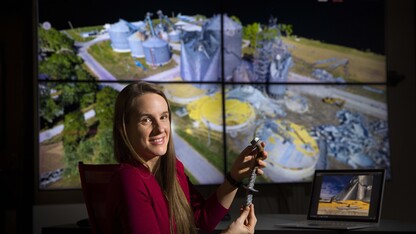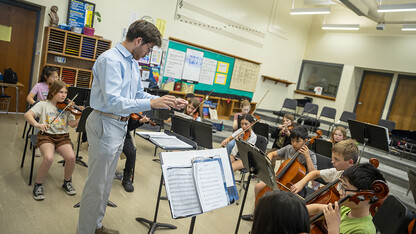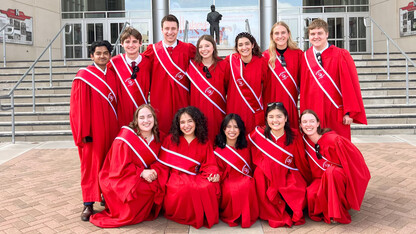· 3 min read
Students swarm to UNL entomologist for class project

Erin Ingram has always believed that the best learning comes when students make connections between class material and their daily lives. And recently, the University of Nebraska-Lincoln doctoral student got to see that notion in motion.
Ingram, an entomologist, worked with second graders at Evelyn Hamlow Elementary School in Waverly on a project about the disappearing honeybee population.
Ingram became involved when Hamlow teacher Missy Schere came across a research article on honeybees written by her. Schere wanted to implement project-based learning in her classroom and needed a real-world question that her students could explore. Project-based learning is a teaching method in which students explore and respond to real-world problems and challenges to reach a deeper level of learning. The focus of the project became how to save honeybees.
For several years, scientists have been working to solve the mystery of Colony Collapse Disorder, a syndrome defined as a dead colony with no adult bees or dead bee bodies but with a live queen and usually honey and immature bees still present. Also, honeybees and beekeepers over the last 30 years have experienced new pathogens, parasites and other pests, nutrition problems and possible sub-lethal effects of pesticides – all serving to weaken or kill honeybee colonies.
Schere incorporated the honeybee issue throughout the school day and used it as a theme for student research, while Ingram’s insight and involvement guided the learning process.
“The students were going home and telling their parents that they needed to plant more flowers to save the honeybees,” Ingram said. “Presenting them with a problem facing their community that they could own resulted in some of the most motivated students I’ve ever seen.”
Ingram visited their classroom, answered questions through a weblog and provided resources from UNL’s Department of Entomology. The department loaned a microscope, iPad, demonstration hive, beekeeping suit and reading materials to Schere’s classroom.
The Department of Entomology’s increased science literacy efforts ensured plenty of resources were available. Ingram said the project was a prime example of the university’s outreach and engagement mission.
“Even if we don’t have the manpower to support, many times there are physical resources that can be checked out to the public,” she said.
At the conclusion of the project, the students presented their findings to classmates, family and the public. Much of what they shared was discovered using UNL resources and through interactions with Ingram.
Schere said she plans to implement another project-based learning program in her classroom soon.
“The students became so enthusiastic and curious about the project that they didn’t even realize when we missed recess,” she said.







